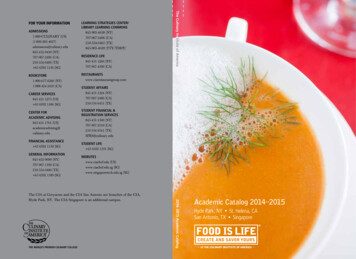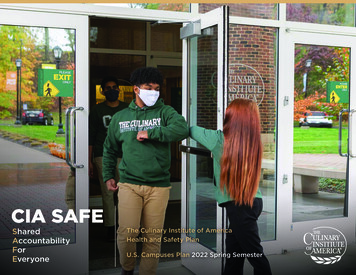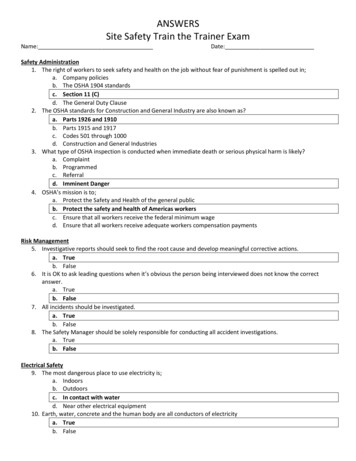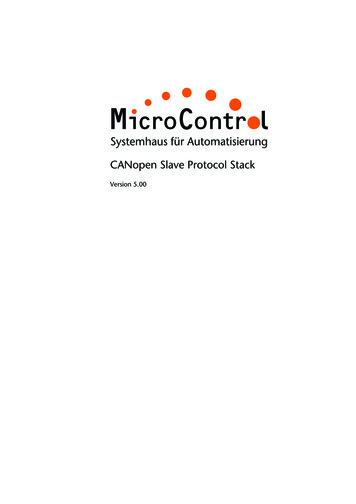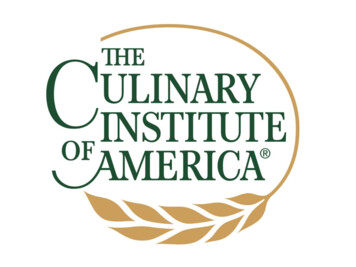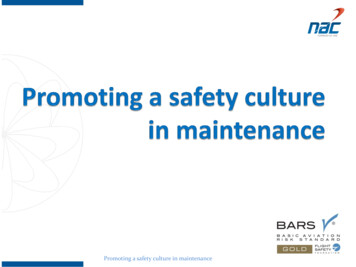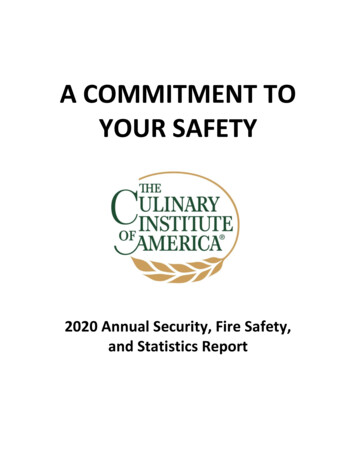
Transcription
A COMMITMENT TOYOUR SAFETY2020 Annual Security, Fire Safety,and Statistics Report
TABLE OF CONTENTSA Safe Campus Environment . 3Safety Programs and Services . 12Campus Safety Awareness . 14Campus Policies . 17Fire Safety . 67Crime Statistics . 70On-Campus Resources . 78Off-Campus Resources . 80CIA Addresses . 822020 Annual Security, Fire Safety, and Statistics Report—The Culinary Institute of America2
A SAFE CAMPUS ENVIRONMENTFostering a Team EffortAt The Culinary Institute of America, ensuring a safe campus for students, faculty, staff, andvisitors is of paramount importance. While safety officers maintain a 24-hour presence at ourresidential campuses, the entire CIA community is involved in fostering an environment whereeveryone can feel secure. Campus safety is everyone’s responsibility; together, we can continueto make the CIA a wonderful place to work, live, and learn.The Culinary Institute of America has four locations: the New York campus in Hyde Park, theCalifornia campus in St. Helena, the Texas campus in San Antonio, and the CIA Singapore.Except where noted otherwise, the information in this report pertains to the three U.S.campuses.Providing Secure Access to FacilitiesNew York Campus:While many campus buildings and facilities are accessible to all during the CIA’s normalbusiness hours, the exterior doors of most residence halls are controlled by an electronic cardaccess system and remain locked at all times. The townhouses on the north end of campus usea key entry system.All exterior doors on campus are periodically inspected by the Facilities Department to ensurethat their locking mechanisms are working properly. Safety officers on patrol routinely checkand report any deficiencies with locks. In case of a campus emergency, Campus Safety has theability to remotely lock down any door with card access capability.California Campus:While many campus buildings and facilities are accessible to all during the CIA’s normalbusiness hours, the exterior doors of most residence halls are controlled by an electronic cardaccess system and remain locked at all times.All exterior doors on campus are periodically inspected by the Facilities Department to ensurethat their locking mechanisms are working properly. Safety officers on patrol will also reportany deficiencies with locks.Texas Campus:CIA buildings require authorized access key card entry at all times, except during special events.Student ID access cards, issued on day one of classes, provide access to CIA buildings duringprescheduled authorized access time periods.2020 Annual Security, Fire Safety, and Statistics Report—The Culinary Institute of America3
Singapore Location:All students are issued ID cards through the CIA’s partner university, the Singapore Institute ofTechnology. Access to kitchens is gained through a magnetic card system, and external doorsare locked with keys by administrative managers.Maintaining a Well-Lit CampusExterior lighting is an important part of our commitment to campus safety. Parking lots,pedestrian walkways, and building exteriors are well-lit. Lighting inspections are conducted on aregular basis by Campus Safety and the Facilities Department (NY and CA) or Pearl Security (TX).The Singapore location is well-lit, including internal roads, parking lots, and buildings. EstateDepartment staff members from Temasek Polytechnic maintain the lighting for the campus andconduct monthly inspections.Working to Keep You SafeNew York Campus:Even while you sleep, we’re still looking out for your safety here on campus. During lateevening hours, safety officers are stationed in the gatehouse at the north entrance to thecampus, checking the identification of persons entering the college.Campus Safety personnel are employed by the CIA and have the authority to ask persons foridentification and determine whether individuals have lawful business at The Culinary Instituteof America. CIA safety personnel also have the authority to issue parking and traffic tickets.Safety personnel are not police or peace officers and do not possess their powers of arrest.Criminal incidents are referred to local law enforcement agencies, all of which have jurisdictionon campus. Formal and informal meetings are held with area police agencies to discuss crimerelated incidents. A written memorandum of understanding exists with New York State Police,the Dutchess County Sheriff’s Office, and the Town of Hyde Park Police Department regardingthe CIA’s reporting, the police response, and the CIA’s cooperation in the investigation of aviolent felony offense or missing residential student. The college often utilizes the services oflocal police agencies to assist in the investigation of crimes on campus. All crime victims andwitnesses are strongly encouraged to immediately report crimes to Campus Safety at 845-4511268 or ext. 1111 from a campus phone, as well as to a local police agency (dial 911). Promptreporting will assist in efforts to protect the campus community, assure the issuance of timelywarning notices, and enable timely disclosure of crime statistics.On a routine basis, fire and police emergency service teams train on the CIA property for avariety of scenarios.2020 Annual Security, Fire Safety, and Statistics Report—The Culinary Institute of America4
The Culinary Institute of America conducts both tabletop and practical exercises to testemergency response and evacuation procedures annually. Emergency notification testing isdone two to three times a year. Students, faculty, and staff are advised of the testing prior tothe test dates.California Campus:Campus Safety personnel at the CIA at Greystone are from a contracted security agency and aresupervised by the director of campus services. The CIA contracts with this agency for securityservices on the Napa Valley campus. Campus Safety has the authority to ask persons foridentification and to determine whether individuals have lawful business at The CulinaryInstitute of America at Greystone. CIA safety personnel also have the authority to issue parkingtickets.Safety personnel are not police or peace officers and do not possess their arrest powers.Criminal incidents are referred to local law enforcement agencies, all of which have jurisdictionon campus. Formal and informal meetings are held to discuss crime-related incidents, andstudents and employees may report crimes directly to local authorities. The college utilizes theservices of local police agencies to assist in the investigation of crimes on campus, and a writtenmemorandum of understanding exists with the St. Helena Police Department. All crime victimsand witnesses are strongly encouraged to immediately report crimes to Campus Safety (ext.2313 or 707-548-2478) and local police (dial 911). Prompt reporting will assist in efforts toprotect the campus community, assure the issuance of timely warning notices, and enable thetimely disclosure of crime statistics. Emergency fire and rescue services are provided by boththe St. Helena Fire Department and the California Department of Forestry and Fire Protection(CAL FIRE).Texas Campus:The CIA San Antonio campus is located in the Pearl District on the grounds of the formerbrewery. Emergency services are provided by dialing 911; the CIA San Antonio does not employits own security personnel. The San Antonio Police Department and the Bexar County Sheriff’sDepartment have jurisdiction over the San Antonio, TX campus. The college has amemorandum of understanding with the San Antonio Police Department concerning thereporting and investigation of crimes on campus. The Pearl Brewery complex has its ownsecurity force that patrols the entire site.Singapore Campus:The Singapore campus does not employ security personnel or conduct patrols. Crimes can bereported to the Singaporean Police Department by dialing 999.2020 Annual Security, Fire Safety, and Statistics Report—The Culinary Institute of America5
Emergency CommunicationThe college utilizes Everbridge for its mass notification needs. All faculty, staff, and studentshave Everbridge accounts and are encouraged to register their personal “paths” (the means bywhich they should be notified during an emergency), such as text message, phone, and e-mail.Additionally, opt-in contact information can be provided via the Everbridge EmergencyNotifications link on CIA Main Menu (ciamainmenu.culinary.edu), the faculty/staff and studentweb portals at the college.All enrolled students are registered in the Everbridge Mass Notification system through theirCIA e-mail account. Students are encouraged to provide additional contact information (e-mailaddresses, phone numbers, etc.) to the notification system during new student orientation.New faculty and staff are enrolled during their new employee orientation. Faculty and staff areencouraged to add and update contact information as well. Students, faculty, and staff are alsoencouraged to download the Everbridge mobile app to their mobile devices.New York Campus:Siren alert systemTwo six-speaker arrays have been mounted at outdoor locations, and certain buildings havespeaker systems throughout. During an emergency, Campus Safety will send a siren tone toalert people walking on campus and in those buildings that an emergency message is to follow.A pre-scripted or live message can be broadcast to alert the college community of anemergency situation.Mass notification systemMembers of the Campus Safety Department are authorized to activate the emergencynotification system (Everbridge) upon determining that a significant emergency exists and willimmediately notify the Dutchess County 911 Center for law enforcement and emergencyservice assistance. Once activated, the system will provide specific information and instructionsto students, faculty, and staff. Emergency notification testing is done two to three times a year.Students, faculty, and staff are advised of the testing prior to the test dates.California Campus:Emergency public address systemThe CIA at Greystone’s emergency public address system broadcasts campus-wide forevacuations and other urgent matters. The system can be activated by the security officers onpatrol, as well as by campus administrators. Messages are preceded by two loud tones followedby a verbal warning. This system can be used to give immediate instructions during emergencyor disaster situations.Mass notification systemThe CIA at Greystone director of campus services and the Campus Safety Department at theHyde Park, NY campus are authorized to activate the emergency notification system2020 Annual Security, Fire Safety, and Statistics Report—The Culinary Institute of America6
(Everbridge) upon determining that a significant emergency exists and will immediately notifylocal law enforcement and emergency services. Once activated, the system will provide specificinformation and instructions to students. Emergency notification testing is done two to threetimes a year. Students, faculty, and staff are advised of the testing prior to the test dates.Details on how to register for notification are provided to all students, faculty, and staff at newstudent and employee orientations. Additional information is available through the director ofcampus services.Texas Campus:Mass notification systemThe Campus Safety Department at the Hyde Park, NY campus is authorized to activate theemergency notification system upon determining that a significant emergency exists and willimmediately notify local law enforcement and emergency services. Once activated, the systemwill provide specific information and instructions to students. Emergency notification testing isdone two to three times a year. Students, faculty, and staff are advised of the testing prior tothe test dates. Details on how to register for notification are e-mailed to all students, and moreinformation is available through the Associate Dean—Degree Programs. Pearl Security can alsomake public address notifications on site.Campus Timely Warning Policy StatementThe Culinary Institute of America makes every effort to provide a safe environment for the CIAcommunity and its guests. In the event that a crime as defined by the Clery Act occurs on ornear a campus and represents a serious or continuing threat to a CIA campus, the college will: alert the appropriately affected campus community in compliance with Clery Act 20 USC1092 (f) in a manner that is timely and provides information about the situation, and provide crime prevention and safety information to faculty, staff, and students.Campus Safety in Hyde Park, NY, in conjunction with appropriate campus administrators, willcoordinate the issuance of a timely warning to a campus community in response to a Clery Actcrime that is reported to campus security authorities or local police agencies and is consideredby the CIA to represent a serious or continuing threat to a campus community.Procedures—U.S. CampusesThe CIA will provide the appropriately affected campus community with a timely warning whenboth: a Clery Act crime has occurred on or near the campus, and said Clery Act crime represents a serious or continued threat to students and/oremployees on the campus.The issuance of a timely warning will be coordinated through the Campus Safety Department atthe Hyde Park, NY campus in conjunction with appropriate campus administrators. Such timely2020 Annual Security, Fire Safety, and Statistics Report—The Culinary Institute of America7
warning notices shall be released as soon as all pertinent information is available and assessedin accordance with the above criteria. The director of campus safety in Hyde Park will providefollow-up notifications as necessary.Decision to Issue Timely Warning—ResponsibilityThe decision to issue a timely warning will be made on a case-by-case basis by the director ofcampus safety in conjunction with appropriate campus administrators. The director of campussafety and administrators shall consider the nature of the Clery Act crime and the continuingdanger to the appropriately affected campus community and the possible risk of compromisinglaw enforcement efforts. Personnel involved in the decision to issue a timely warning willdetermine: the process used to confirm that there is a significant emergency or dangerous situation, the content of the notification, and the specific notification system to be used.The decision to issue and the actual issuance of a timely warning are done by the director ofcampus safety in coordination with one or more of the following individuals:New York Campus: Vice President—Finance and Administration Provost Associate Vice President and Dean—Student Affairs Associate Dean—Student Affairs and Housing Title IX CoordinatorCalifornia Campus: Managing Director Associate Vice President—Branch Campuses General Manager—Greystone Associate Dean—Degree Programs Director—Campus ServicesTexas Campus: Managing Director Associate Vice President—Branch Campuses Associate Dean—Degree ProgramsContent of a Timely WarningA timely warning will provide the appropriate campus community with information about the Clery Act crime, that explains how individuals can protect themselves, and that aids in the prevention of similar crimes.Issuing a Timely Warning2020 Annual Security, Fire Safety, and Statistics Report—The Culinary Institute of America8
If the director of campus safety determines that a Clery Act crime has been committed andconstitutes a serious or continuing threat to the CIA community, a timely warning will beissued.The CIA may use one or more of the following modes of notification to issue thetimely warning: Siren alert system—consists of outdoor and indoor speakers that produce a loud alertsignal followed by a pre-scripted or live voice message E-mail messages Emergency notification system (Everbridge)—a third-party-hosted vendor system usedto notify the CIA community of an emergency on a U.S. domestic campus, using text,e-mail, and voice notification. Students are automatically entered in the system throughtheir CIA account. Opt-in information is provided to each employee and student to addadditional means for notification (e.g., phone, text, e-mail, the mobile app) Flyers and posters—displayed in the residence halls CIA website—www.ciachef.edu CIA faculty/staff/student portals—ciamainmenu.culinary.eduA copy of the timely warning will be maintained with Campus Safety at the Hyde Park, NYcampus.Procedures—Singapore LocationThe decision to issue a timely warning will be made by the managing director of the CIASingapore in consultation and coordination with the associate vice president of branchcampuses and the administration of the Singapore Institute of Technology (SIT). When it hasbeen determined that a Clery Act crime has been committed and constitutes a serious orcontinuing threat to the CIA community, a timely warning will be issued using the guidelines setforth in this policy to the extent that said notice shall not be contrary to the direction ofSingaporean law enforcement.A timely warning will be issued using one of the following modes of communication, which willbe mutually agreed upon by the SIT administration and the CIA Singapore managing director: Student/employee e-mail Student/employee portal Other such meansThe managing director of the CIA Singapore will be responsible for maintaining appropriaterecords of the timely warning notification and should immediately alert the director of campussafety at the Hyde Park, NY campus of any such event.Emergency Response and Evacuation Review2020 Annual Security, Fire Safety, and Statistics Report—The Culinary Institute of America9
On a yearly basis, the director of campus safety and/or the managing director will assemble agroup of administrators from Student Services, Residence Life, Facilities, and other departmentsas needed to review and test evacuation procedures and the twice-per-year testing ofemergency notifications systems. The results of these exercises will provide the CIA with anopportunity to review and improve upon its already established processes and procedures.Feedback from the exercises will be posted on CIA Main Menu on the Campus Safety page. Theexercises include: A walk-through of building evacuation routes and a review of designated meeting areas. Testing of the college’s mass notifications systems (text, e-mail, phone). Testing of the siren alert and public address systems. Review of current processes with emergency personnel.Emergency Response and Evacuation NotificationCampus Safety and/or the administration at any of the three U.S. campuses receive reports ofemergency situations from the CIA community as well as local law enforcement units, andtherefore have the primary responsibility for monitoring and confirming an emergency ordangerous situation.Upon receiving a report of, or determining that there is, a significant emergency:New York Campus:Campus Safety will dispatch safety personnel and notify local law enforcement. The director ofcampus safety will alert, and bring together as necessary, members of the college’s CriticalIncident Management Team.*California Campus:Campus Safety will notify local law enforcement. Campus Safety and/or the administration willalert, and bring together as necessary, members of the college’s Critical Incident ManagementTeam.*Texas Campus:911 should be called immediately. The administration will alert, and bring together asnecessary, members of the college’s Critical Incident Management Team.** The CIMT is a decision-making body for the college that consists of senior-level administration.Upon confirmation of an emergency or dangerous situation that involves a significant threat tothe health and/or safety of the campus, Campus Safety and/or the administration will, withoutdelay and taking into account the safety of the community: identify the appropriate segment of the campus community to be notified (if theincident is limited to a specific building or location), develop the content of the message, and determine that notification will not compromise efforts to assist victims or to contain,respond to, or otherwise mitigate the emergency.2020 Annual Security, Fire Safety, and Statistics Report—The Culinary Institute of America10
Once activated, the notifications will provide specific information and instructions to the CIAcommunity about the emergency. In the event of an actual emergency, the CIA community willbe notified through Everbridge and other methods of communication, including e-mails, postingon CIA Main Menu (the student and employee web portals), text messages, and voicecommunication. See “Emergency Communication” on page 6.Evacuation ProceduresAll students receive instruction concerning emergency plans and evacuation procedures duringtheir initial safety orientation. Our plans are simple: When the alarm sounds, use the nearest available and appropriate exit (which may be awindow) and immediately exit the building. Move quickly but calmly to a safe location. In the event of an armed intruder, if you can safely escape, it is suggested that you do so. If escaping is not a possibility, you may have to shelter in place. If you are confronted by the intruder, use any means possible to deter, resist, overcome,and/or evade the person.2020 Annual Security, Fire Safety, and Statistics Report—The Culinary Institute of America11
SAFETY PROGRAMS AND SERVICESThe Importance of Crime PreventionThe old saying “an ounce of prevention is worth a pound of cure” definitely applies to campussafety. Our goal is to prevent crimes rather than react to them after they have occurred.Toward that end, the college’s Crime Prevention Program seeks to help minimize criminalopportunities and encourages students and employees to be responsible for their own securityand the security of others on campus.Here are some features of the program at each campus that help achieve these goals:New York Campus: Escort program—Escort provided upon request for persons walking on campus,particularly after dark.Residence hall security—Crime prevention programs periodically presented byResidence Life staff.Emergency telephones—Interior and exterior phones that connect to Campus Safety.Closed-circuit cameras—Located in strategic areas (both indoors and out) throughoutcampus.Crime prevention tips and brochures—Available at various locations throughout campusand posted online.Operation Identification—Engravers available for students to engrave serial numbers orowner-recognized numbers on all valuable items on campus.Bicycle registration—Offered through the Residence Life Office; students provide serialnumbers and other data useful in recovering bicycles in the event of theft.Student Safety and Sexual Assault Awareness Committee—CIA staff, faculty, andstudent representatives review the college’s security policies and procedures andannually make recommendations for their improvement.Student success alcohol abuse prevention—Training required for all incoming students.Student success risk reduction and bystander intervention—Training required for allreturning sophomores.See Something, Say Something—At new student orientation or at time of hire, allstudents and employees are instructed to practice “See Something, Say Something” oncampus, in which they are urged to immediately report anything suspicious, dangerous,or illegal to Campus Safety.California Campus: Escort program—Escort provided upon request for persons walking on campus,particularly after dark.Residence hall security—Crime prevention programs presented at student housing andsafety orientation during move-in.2020 Annual Security, Fire Safety, and Statistics Report—The Culinary Institute of America12
Crime prevention tips and brochures – Disseminated to students and posted online.Emergency telephones—Interior and exterior phones that connect to Campus Safety.Closed-circuit cameras—Located in strategic areas throughout campus.Student success alcohol abuse prevention—Training required for all students.See Something, Say Something—At new student orientation or at time of hire, allstudents and employees are instructed to practice “See Something, Say Something” oncampus, in which they are urged to immediately report anything suspicious, dangerous,or illegal to Campus Safety.Texas Campus:Escort program—Escort provided upon request by Pearl Security for persons walking oncampus, particularly after dark.Closed-circuit cameras—Located in strategic areas.Crime prevention tips and brochures —Outlined in the Student Handbook and postedonline.Student success alcohol abuse prevention—Training required for all students.Education is KeyAt student orientation for all incoming freshmen, Campus Safety, Residence Life, and otheradministrators offer crime prevention presentations dealing with personal and fire safety.Students are instructed on how to report incidents and crimes. In addition, fire safety andevacuation are discussed.This proactive education is ongoing. Throughout the academic year, other presentations andcampus-wide programs are offered on topics such as rape and acquaintance rape, avoiding andresponding to sexual offenses, and sexual harassment. Please reference the Harassment, SexualMisconduct, and Discrimination Policy statements beginning on page 17 for details on studentand employee sexual assault prevention and related training.During employee orientation, the following safety topics are presented: Preventing and reporting accidents and injuries Reporting hazards and emergencies Fire safety Emergency evacuations Enrolling in the emergency notification system2020 Annual Security, Fire Safety, and Statistics Report—The Culinary Institute of America13
CAMPUS SAFETY AWARENESSPreparation and Disclosure of Crime StatisticsTo promote safety and security at The Culinary Institute of America, and in accordance with therequirements of the Clery Act, the college: Submits crime statistics to the United States Department of Education—Each year, thecollege submits crime statistics for reported Clery Act crimes that occur:on campus,on public property within or immediately adjacent to the campus, andin or on non-campus buildings or property that the CIA owns or controls.The crimes are categorized by type, location, and year. Crime data is collected andreported the same as is done for the annual security report and is maintained by thedirector of campus safety. Publishes and maintains an annual security report—The annual report contains safety-,security-, and fire-related policy statements and statistics of Clery Act crimes occurring oncollege property, adjacent public property, and non-college property owned or controlledby the college, for the preceding three years. The report (A Commitment to Your Safety)is based upon the calendar year. To prepare this report, Campus Safety at the Hyde Park,NY campus collects statistical information from incidents that have been reported toCampus Safety, Campus Security Authorities (see page 70), and local law enforcementagencies having jurisdiction on each respective campus. In addition, information ondisciplinary referrals for liquor law, drug law, and weapons possession violations isgathered in conjunction with Student Affairs, which is responsible for student discipline.A copy of the report is available on October 1 each year). The report is distributedannually to all students and employees through the faculty/staff and student portals. Itis also available at www.ciachef.edu/safety-and-security and the Department ofEducation website at http://ope.ed.gov/security. Hard copies of the report can berequested at Campus Safety, 1946 Campus Drive, Hyde Park, NY 12538. Maintains a daily crime log—A daily crime log is required for campuses that have acampus security department. This is a log of crimes that are reported to Campus Safetyand is available for public viewing. It includes the date the crime was reported, the dateand time it occurred, the nature of the crime, the general location of the crime, and thedisposition of the incident, if known.CRIME LOG LOCATION:New York Campus: Campus Safety OfficeCalifornia Campus: Director of Campus Services OfficeTexas Campus and Singapore Location: N/A2020 Annual Security, Fire Safety, and Statistics Report—The Culinary Institute of America14
Reporting Criminal Activity or an EmergencyNew York Campus:Campus Safety is responsible for the enforcement of campus rules and regulations. Safety oncampus, however, must be a collaborative effort among students, faculty, and staff. Weencourage you to report any suspicious circumstances, criminal activity, or emergency to asafety officer as soon as possible. The sooner an incident is reported, the better we can renderaid, protect life and property, and conduct an effective, successful investigation. Students,faculty, and staff are also encouraged to report crimes to area police agencies.The Campus Safety office is conveniently located adjacent to the maintenance garage behindRoth Hall, and is staffed 24 hours a day, seven days a week. If you’re some distance from thesafety office, you can use one of the many blue-light, direct-ring phones located throughout thecampus, as well as the call boxes located at the main entrance of each residence hall. Theseemergency phones can be used to report a criminal incident, a fire, or any other emergency, orto req
The Culinary Institute of America has four locations: the New York campus in Hyde Park, the California campus in St. Helena, the Texas campus in San Antonio, and the CIA Singapore. Except where noted otherwise,
